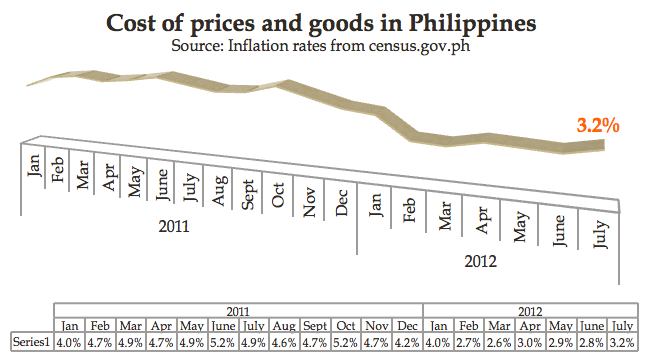SUMMARY
This is AI generated summarization, which may have errors. For context, always refer to the full article.

MANILA, Philippines (UPDATED) – The onslaught of Typhoon Gener (international codename Saola) is one of the reasons for the increase in inflation to 3.2% in July, according to the National Economic and Development Authority (NEDA).
In a phone interview, NEDA National Planning and Policy Staff Director Rosemarie G. Edillon told Rappler that higher prices of fish and fruits were due to supply disruptions.
These supply disruptions occured in the last week of July, when Typhoon Gener was in the country.
“Higher food prices is part of that (increase in inflation), specifically fruits and fish. There were supply disruptions due to Gener in the last week of July,” Edillon said.
Higher inflation in August
Edillon said that with the southwest monsoon causing so much flooding, there is a possibility that inflation will be higher in August.
She said that specifically, higher prices will be felt in the National Capital Region (NCR). However, Edillon said there is still no way of knowing if this will be enough to impact inflation nationwide.
The NEDA Official added that since it is only the first week of August, there is no assurance whether this track of higher inflation will be sustained or not.
Former Budget Secretary Benjamin Diokno said this increase in inflation will only be temporary.
Diokno said that with only 5 months to go to the end of 2012, the benign inflation environment will continue. He expects inflation to still be within the 3% to 5% range forecasted by the Central Bank.
“There might be a slight rise in prices as a result of the ongoing damages to crops and vegetables. But I expect the rise to be temporary. Policymakers should continue to prioritize growth and job creation to price stability,” Diokno said.
Inflation hits 6-month high
The National Statistics Office (NSO) reported that inflation went up to 3.2% in July, the second highest inflation rate recorded this year.
The highest inflation rate this year was the 4% recorded in January. With this, inflation between January to July was at 3.1%.
The inflation rate recorded in July as well as year-to-date inflation are both within the Central Bank’s 3 to 5 percent inflation target for 2012.
“The country’s month-on-month inflation decelerated to 0.3% in July from 0.5% in June. Price increases were observed in food items like rice, meat, fish, vegetables and sugar. However, this was tempered by the downward price adjustments in cooking oil, selected condiments and seasonings, gasoline and diesel,” the NSO said.
Higher food prices
The heavily-weighted food index inched up 2.2% in July from 2% in June.
Food items which posted higher prices were rice, corn, meat, fish, milk and cheese, and fruits.
However, factors that tempered the increase in food prices were vegetables whose prices remained the same as well as the slowdown in the prices of other food items that were not classified by the NSO.
Inflation in Metro Manila higher
Commodity prices in the National Capital Region (NCR) jumped to 3.1% in July from 2.2% in June.
This was largely due to higher commodity prices led by the food index which posted an increase of 1.7% in July from 0.8% in June.
Food items that posted increases were corn, meat, and vegetables. The slower increase of prices in the fruits index helped temper inflation.
Core inflation, which excludes volatile food and energy items, was higher at 4.1% against 3.7% in June.
The Bangko Sentral ng Pilipinas (BSP) adjusts its monetary policy based on the core inflation rates.
Power costs
In a statement on Wednesday, the BSP said that the higher inflation for July was also traced to higher power costs and liquefied petroleum gas (LPG).
In July, the Malampaya pipeline, which brings natural gas sourced near Palawan to power plants in Batangas, had maintenance shutdown for 8 days, prompting power retailers to buy energy from alternative and more expensive sources.
Nonetheless, BSP governor Amando Tetangco Jr. stressed that they will “continue to keep a close watch on the evolving balance of risks to inflation to ensure that monetary policy remains supportive of…economic growth.” – Rappler.com
For more weather updates, visit the #WeatherAlert Microsite.
Everyone is encouraged to help out. Check this list of evacuation centers and relief operations in Metro Manila for places near you.
If you have photos you’d like to share, send them to us @rapplerdotcom on Twitter, or send them via email to desk@rappler.com.
More in #WeatherAlert:
- Person Finder: 2012 Philippines Floods
- What’s the weather like in your area?
- US pledges P4-M for disaster relief
- LIVE BLOG: August 8 weather and disaster-related updates
- LIVE BLOG: Flood, traffic updates, photos
- Live Blog: Overnight monsoon and flood monitoring, August 8
- A night of fear and rain
- Almost P13M in relief aid distributed
- PHOTOS: PH capital, nearby cities at a standstill in floods
- Filipino values emerge in deluge
Add a comment
How does this make you feel?
There are no comments yet. Add your comment to start the conversation.